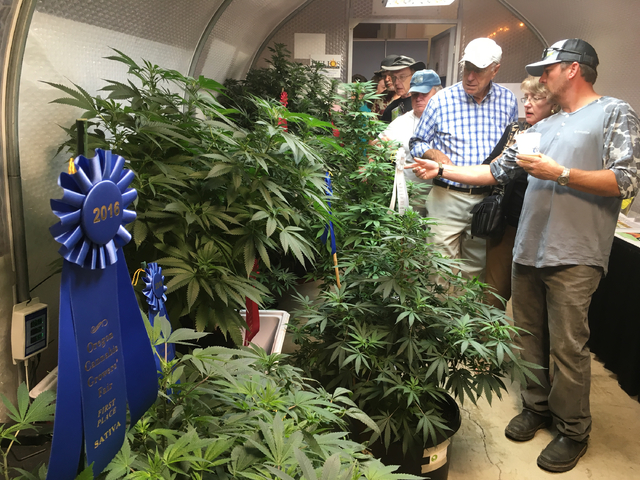Oregon agency that accredits pot labs on verge of “collapse”

ASSOCIATED PRESS
Fair-goers examine cannabis on display at the Oregon State Fair of plants that won ribbons at the inaugural Oregon Cannabis Growers’ Fair Monday, Sept. 5, 2016, in Salem, Ore.
SALEM, Ore. >> As Oregon officials struggle to license all sectors of the recreational marijuana industry before the end of the year, a top official of the agency that accredits pot-testing labs says it is overwhelmed — a potential blow to the rollout.
Gary K. Ward, administrator of the Oregon Environmental Laboratory Accreditation Program, known as ORELAP, emailed dozens of labs awaiting licenses, saying his agency’s abilities to accredit them is “on the precipice of collapse … because of the lack of resources and the last minute rush of cannabis labs with applications.”
Ward’s complaints have drawn the attention of Gov. Kate Brown. Ward said in his Aug. 26 email that he had asked for three full-time employees to handle cannabis lab accreditation, and received none. Only three labs have been accredited, according to an official web site. A spokesman put the number at four.
If more labs aren’t accredited, marijuana producers will lack tested products to sell. Retailers will have bare shelves.
“This has been extremely worrisome for the industry,” Donald Morse, director of the Oregon Cannabis Business Council, said in a phone interview with The Associated Press. “I have spoken with people in all agencies … and we’ve warned them for months this bottleneck was coming because of their inability get these accreditations done.”
Steven Marks, executive director of the Oregon Liquor Control Commission which is in charge of regulating and licensing recreational marijuana, told AP that “it’s an absolute concern of ours” that ORELAP is overburdened and attributed it to “a bumpy transition” in Oregon’s marijuana industry, in which previously only medical marijuana was legal.
Don't miss out on what's happening!
Stay in touch with breaking news, as it happens, conveniently in your email inbox. It's FREE!
But he said in a telephone interview that expects recreational retailers to be licensed and operating by the end of the year. They will be eligible to open after Oct. 1, when a new tax structure becomes effective. Marks expects three more labs to be accredited this month.
“That should be enough testing capacity to get this moving forward,” he said.
The state is racing to set up the recreational marijuana industry after voters legalized it in a 2014 ballot measure.
Unless recreational retailers are in business and selling tested products by Jan. 1, when dispensaries will be allowed to sell only medical marijuana, tax revenues will drop. The state hauled in $25.5 million in marijuana tax payments through July 31 this year, the revenue office reported recently.
“The tax revenue will go from that to zero if we have no product to sell,” Morse said.
New rules require testing of marijuana by accredited labs, which look for pesticides, potency and solvents.
Jeremy Sackett, co-founder of Cascadia Labs, said he is awaiting accreditation and that an inspection by ORELAP is scheduled for next week. The company has one lab in the Portland area and another in Bend.
“It would be unfortunate if the State were not able to support and effectively implement the well-developed regulations that have been enacted,” Sackett told AP in an email.
The Oregon Health Authority, which oversees ORELAP, said Tuesday it is committed to taking steps to ensure laboratory accreditation “even with growing demand,” and will find a solution. Spokesman Jonathan Modie said the authority hired a full-time assessor in October 2015, bringing the number to three, and a temporary assessor in July to assess cannabis labs.
Morse said Ward’s “cry for help is a smart thing to do, because no one has been listening.” He added that he hopes the governor’s office will step in and ensure ORELAP gets more resources.
Brown’s office said the lab accreditation process is “important to ensuring public health and safety as Oregon’s new recreational marijuana laws are implemented.”



